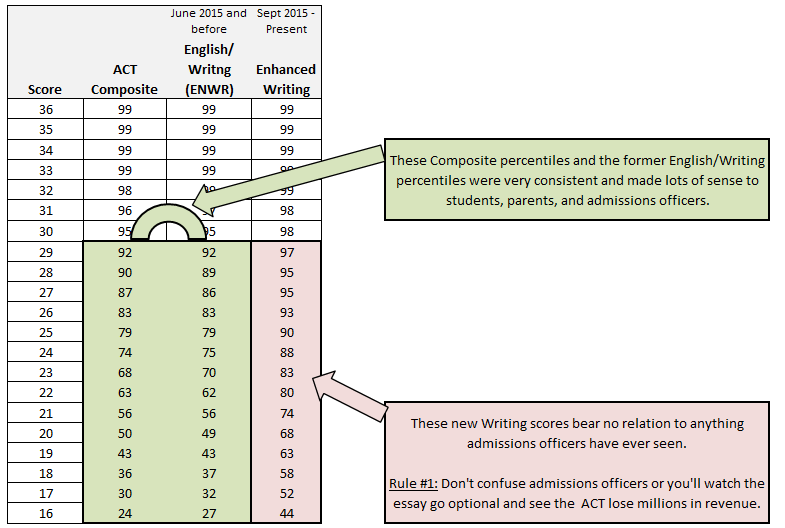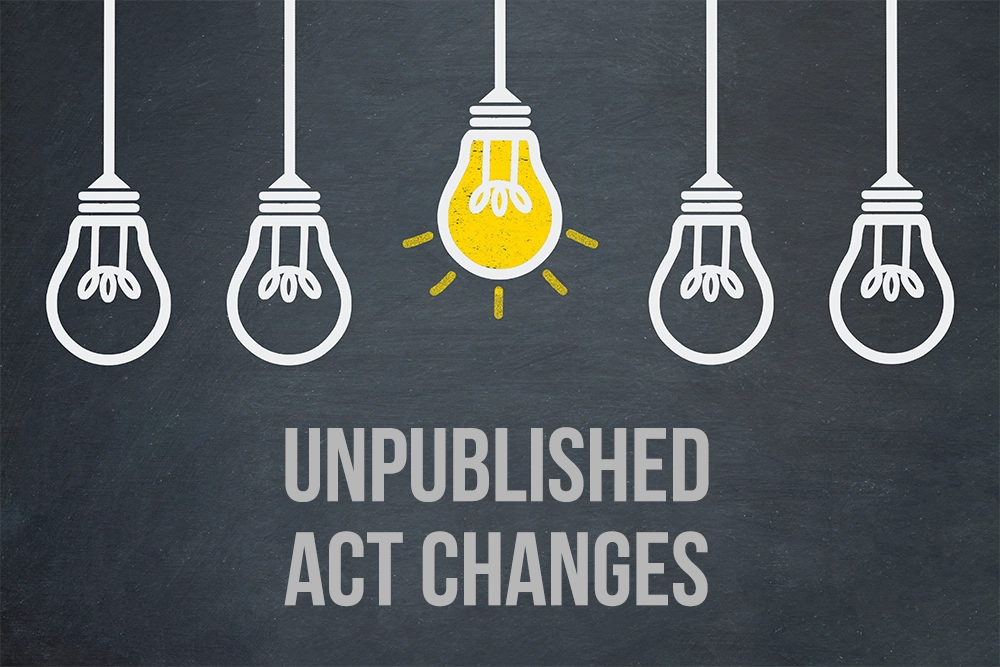The Unpublished Changes to the ACT, Part III: The New Essay’s Tough Scale, Science Section Changes, and Score Release Delays
Note: This blog post is the third (and hopefully final!) post in a series about very consequential but under-the-radar changes to the ACT. For the first two parts of this series please see these two links: Part 1 | Part 2
The continued changes to the ACT may not have been as heavily covered in the mainstream media as the new SAT that debuts in March 2016, but these changes are just as important.
Three additional ACT changes are addressed in this post:
1) The new “Enhanced Writing” (essay) has a radically different scoring scale, and why you shouldn’t necessarily worry
2) ACT Science changed its format from containing 7 passages to almost always containing 6 passages
3) ACT is now having perpetual score release delays due to the new “enhanced” essay
1) The new ACT essay has a radically different scoring scale, such that 90%+ of students are scoring far lower on the new Essay than they did / would have on the old-format Writing test that ended in June 2015.
A) Old Format (June 2015 and before): The ACT used to report the essay score on a 0 to 12 scale and calculate a Combined “English+Writing” (ENWR) score out of 36. This ENWR was very easy to do well on since it was weighted roughly 70% via the English section score and 30% via the 12-point essay score. The English section is–by leaps and bounds–the easiest section to score well on if a student practices, whereas only 1% of students used to get a 10, 11, and 12 out of 12 – combined. Thus, as long as students had a good English score, they could earn a respectable ENWR score even with a mediocre writing sample.
B) New Format (Sept. 2015 to present): The new “Enhanced Writing” score is now reported purely based on the writing sample (essay). The same 12-point scale is now used, but on four separate pillars (Ideas and Analysis, Development and Support, Organization, and Language Use). The new score is thus out of 48 points (4 pillars x 12 points = 48 points), which is then scaled to a 36 point bell-curved score; you cannot just multiply the 48-point score by 0.75 to get your score. Many of our hardworking students who wished to practice were shocked that only two sample prompts for the new essay were released by the ACT. Six months later, there are still only two prompts, despite public outcry from students and parents.
C) The new essay scoring and score percentiles are radically out of whack with what colleges are used to, so much so that the new essay is virtually worthless. The percentiles and the curve for the new 36-point Enhanced Writing score is highly divergent from both the Old Writing score ( ENWR) from last year and the general Composite scores that students are used to. The New Enhanced Writing score is far more punitive. For example, a 21 Composite score is the national average. Parents are used to that average of 21. However, only 26% of students get a 21 on the new Enhanced Writing score. The national average on the new essay is not a 21…it’s a 16.5! Over half of America doesn’t even get a 17 on the new Essay, which confuses parents, since on the Composite scale that they’re used to, a student with a 17 Composite score wouldn’t even be allowed to apply to Georgia Southern, a college with one of the least rigorous ACT requirements in the entire Southeast. Heck, GA Southern requires a 20 (3 points higher!) to even apply for probationary status. Only 1/3 of America hits that 20 on the New Essay.
Look at this chart comparing the percentiles for the Composite score, Old Essay, and New Essay:
While the Science section still has the same 40 questions as before, students need to be aware that beginning earlier this year, the ACT has switched to almost always having 6 longer passages instead of 7 shorter ones. All but one of the publicly-available practice tests have 7 passages, so students need to keep this in mind as they pace themselves on test day or they’ll mis-allocate their time.3) The ACT is now having perpetual score release delays mostly due to the new “enhanced” essay:
The ACT has had major score release delays for all three Fall 2015 exams, mostly due to the complexities of grading the new essay on the new 4-pillar scale, and due to their new calculations of oddball indices like the “STEM subscore” that colleges neither asked for or are likely to use in any fashion for admissions purposes. The ACT has claimed that these delays are due to others things, among them “excessive humidity” (can’t make this stuff up).
Whereas the ACT had gotten students used to a snappy 9-day turnaround prior to Fall 2015, many of our students from the October test had to wait over 55 days for scores, including seniors who missed crucial application and scholarship deadlines as a result. The ACT embarrassingly had to ask universities to consider using “screenshots” of students’ scores because their essay-based score release delays were making it impossible for colleges to get those scores in time for the Early Action/Early Decision processes. Thus, until the ACT returns to timely and reliable score reporting, our longstanding advice of trying to finish all ACTs by June of your Junior year will be more important than ever.
Overall:
This is a year of massive change and headaches for the Class of 2017 on both tests, not just the SAT. We’ll continue adding new blog posts on this page every few months. Feel free to like our Edison Prep Facebook page where we post 2-3x weekly to keep abreast of current news!
Questions?
Call us at 404-333-8573 or email us at [email protected]!
Sources:
1) ENWR scores (June 2015 and before)









